第2章
At night the wicket gate is replaced by a solid door. The little garden is no wider than the front of the house; it is shut in between the wall of the street and the partition wall of the neighboring house. A mantle of ivy conceals the bricks and attracts the eyes of passers-by to an effect which is picturesque in Paris, for each of the walls is covered with trellised vines that yield a scanty dusty crop of fruit, and furnish besides a subject of conversation for Mme. Vauquer and her lodgers; every year the widow trembles for her vintage.
A straight path beneath the walls on either side of the garden leads to a clump of lime-trees at the further end of it; LINE- trees, as Mme. Vauquer persists in calling them, in spite of the fact that she was a de Conflans, and regardless of repeated corrections from her lodgers.
The central space between the walls is filled with artichokes and rows of pyramid fruit-trees, and surrounded by a border of lettuce, pot-herbs, and parsley. Under the lime-trees there are a few green-painted garden seats and a wooden table, and hither, during the dog-days, such of the lodgers as are rich enough to indulge in a cup of coffee come to take their pleasure, though it is hot enough to roast eggs even in the shade.
The house itself is three stories high, without counting the attics under the roof. It is built of rough stone, and covered with the yellowish stucco that gives a mean appearance to almost every house in Paris. There are five windows in each story in the front of the house; all the blinds visible through the small square panes are drawn up awry, so that the lines are all at cross purposes. At the side of the house there are but two windows on each floor, and the lowest of all are adorned with a heavy iron grating.
Behind the house a yard extends for some twenty feet, a space inhabited by a happy family of pigs, poultry, and rabbits; the wood-shed is situated on the further side, and on the wall between the wood-shed and the kitchen window hangs the meat-safe, just above the place where the sink discharges its greasy streams. The cook sweeps all the refuse out through a little door into the Rue Nueve-Sainte-Genevieve, and frequently cleanses the yard with copious supplies of water, under pain of pestilence.
The house might have been built on purpose for its present uses.
Access is given by a French window to the first room on the ground floor, a sitting-room which looks out upon the street through the two barred windows already mentioned. Another door opens out of it into the dining-room, which is separated from the kitchen by the well of the staircase, the steps being constructed partly of wood, partly of tiles, which are colored and beeswaxed.
Nothing can be more depressing than the sight of that sitting- room. The furniture is covered with horse hair woven in alternate dull and glossy stripes. There is a round table in the middle, with a purplish-red marble top, on which there stands, by way of ornament, the inevitable white china tea-service, covered with a half-effaced gilt network. The floor is sufficiently uneven, the wainscot rises to elbow height, and the rest of the wall space is decorated with a varnished paper, on which the principal scenes from Telemaque are depicted, the various classical personages being colored. The subject between the two windows is the banquet given by Calypso to the son of Ulysses, displayed thereon for the admiration of the boarders, and has furnished jokes these forty years to the young men who show themselves superior to their position by making fun of the dinners to which poverty condemns them. The hearth is always so clean and neat that it is evident that a fire is only kindled there on great occasions; the stone chimney-piece is adorned by a couple of vases filled with faded artificial flowers imprisoned under glass shades, on either side of a bluish marble clock in the very worst taste.
The first room exhales an odor for which there is no name in the language, and which should be called the odeur de pension. The damp atmosphere sends a chill through you as you breathe it; it has a stuffy, musty, and rancid quality; it permeates your clothing; after-dinner scents seem to be mingled in it with smells from the kitchen and scullery and the reek of a hospital.
It might be possible to describe it if some one should discover a process by which to distil from the atmosphere all the nauseating elements with which it is charged by the catarrhal exhalations of every individual lodger, young or old. Yet, in spite of these stale horrors, the sitting-room is as charming and as delicately perfumed as a boudoir, when compared with the adjoining dining- room.
The paneled walls of that apartment were once painted some color, now a matter of conjecture, for the surface is incrusted with accumulated layers of grimy deposit, which cover it with fantastic outlines. A collection of dim-ribbed glass decanters, metal discs with a satin sheen on them, and piles of blue-edged earthenware plates of Touraine ware cover the sticky surfaces of the sideboards that line the room. In a corner stands a box containing a set of numbered pigeon-holes, in which the lodgers' table napkins, more or less soiled and stained with wine, are kept. Here you see that indestructible furniture never met with elsewhere, which finds its way into lodging-houses much as the wrecks of our civilization drift into hospitals for incurables.